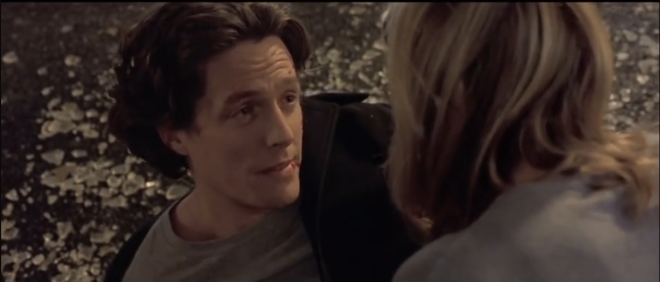Picture the scene:
A man, wearing a pastel flower-print shirt and unmatching shorts, runs down the street after a stylishly dressed woman.
HIM: Um, look.
She turns around.
HIM: Sorry. I just… um, well this is a really stupid question, particularly in view of our recent shopping excursion [they had just been shopping together for the woman’s wedding gown]… but ah… I just wondered… if by any chance, um… ah… well obviously not, because I’m just some git who’s only slept with nine people… but I just wondered… I really feel… um… in short, to recap in a slightly clearer version… in the words of David Cassidy, in fact, while he was still with The Partridge Family… I THINK I LOVE YOU. And I just wondered if by any chance you wouldn’t like to… um… ah… um… no… no… no, of course, not. I’m an idiot. He’s not. Excellent, excellent. Fantastic. Lovely to see you. Sorry to disturb. Better get on.
The man turns to leave.
HER: That was very romantic.
The man turns to face her again and winces.
HIM: Well, I thought it over a lot. I wanted to get it just right.
That’s a scene from the 1994 movie Four Weddings and a Funeral. The man in the scene is played by Hugh Grant, in his typical 90s role as a boyishly charming uber-Englishman.
I bring this scene up because over the last few days, I’ve been talking about denial. When people are faced with a situation… or realization… or personal characteristic that they find unacceptable… and so they take various evasive maneuvers.
Such as for example, making a joke out of it.
That’s what’s happening in the last line of that scene above. Hugh has just put his heart on the line, he’s been tacitly rejected, and he’s made a donkey out of himself.
What better way to put it all behind than with a bit of irony?
Vilaynur Ramachandran, the neuroscientist whose book got me thinking about denial in the first place, says that denial explains why so much of humor deals with sensitive topics like sex and death.
And I guess it explains 90% of the life work of Woody Allen.
So the conclusion is, when you hear people making a joke out of something… well, um… ah… to put it more concretely, in the words of Eric Idle in fact, while he was still with Monty Python… WHEN YOU PURSE YOUR LIPS AND WHISTLE, IT MEANS YOU’RE CHEWING ON — but of course. How silly of me. Sorry, terrible. You must already know what I’m getting at. And you wouldn’t perhaps want to… but of course not. No. Excellent. Excellent. Lovely to see you. Better get on.

